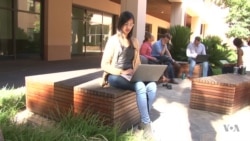Nashville may be known as “Music City” in the United States, but on the west coast, some folks might argue Silicon Valley is just as worthy of the moniker.
Audio and music technology companies like Dolby Laboratories, Pandora and Smule are just a few of the businesses that call the region home. For musically inclined techies who hope to eventually work in the industry, one non-profit is shedding light on the opportunities available beyond singing and performing.
“Music technology is applications of STEM subjects like electrical engineering and computer science to music and audio applications,” said Priya Shekar, program director at non-profit Real Industry, “That could be everything from designing new music apps, all the way to designing filters and effects that are used in audio production, to designing new instruments,” she added.
Through a series of online courses and in-person workshops, Real Industry connects tech students, recent graduates and professionals with mentors in the music and entertainment industries. Participants get firsthand access to executives from companies like Sol Republic, Turtle Beach and Sonos.
More than 6,000 students from around the world have participated in the online courses and more than 200 have attended workshops in California.
“You’re actually learning about the insides of these companies and the products they build,” said Shekar. Real Industry has also partnered with universities like Stanford, the University of Michigan and New York University to have courses like “Careers in Media Technology” on campus.
“I think a lot of jobs and responsibilities and careers go unexposed; they kind of stay behind the scenes of these companies,” said Shekar, who is an electrical engineer herself, with experience creating music education applications. “Having exposure lets [students] bring context to what they’re learning in school and all their other classes, but also help them prepare for life after school.”
For industry executives, the experience provides invaluable feedback.
“Industry folks are learning about what the next generation is learning, being able to tap into all of that fresh innovation and all these fresh ideas from these young kids who are users of products and fans of their products,” Shekar noted.
For Shekar, who is originally from New Zealand, the experience is not unlike her journey to Silicon Valley. “It’s about knowing where to take that first step. A lot of people just don’t even know where to start.” For music technologists hoping to break into the business, the answer might just be Silicon Valley.





